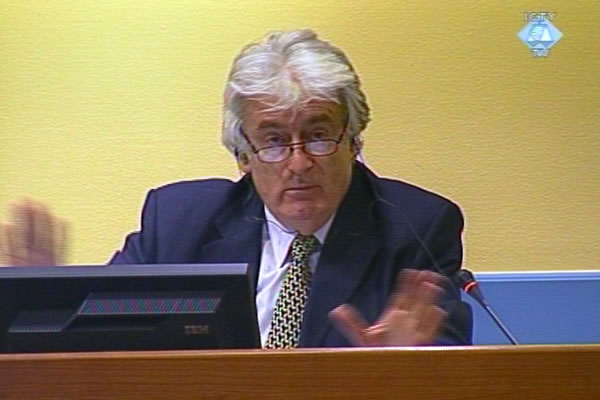Home
KARADZIC: SUSPEND PROCEEDINGS, THERE CAN BE NO FAIR TRIAL
After failing to further delay the proceedings, Radovan Karadzic has asked for the suspension of the trial because of the ‘cumulative effect’ of the Trial Chamber’s decisions to take judicial notice of adjudicated facts and admit statements and evidence of witnesses from other cases; those decisions have ‘deprived him of the right to fair trial’
 Radovan Karadzic in the courtroom
Radovan Karadzic in the courtroom A week before the scheduled opening of the prosecution case, Radovan Karadzic has asked for the suspension of his trial because ‘there can be no fair trial’. In his motion, Karadzic explains that the fair trial is impossible because of ‘the cumulative effect’ of the Trial Chamber’s decision to formally take judicial notice of adjudicated facts from other cases and admit statements or transcripts of evidence without the cross-examination of witnesses.
The Trial Chamber, Karadzic says in his motion, formally took judicial notice of 1,500 adjudicated facts from the Stanislav Galic case and final judgments in the cases of Srebrenica genocide and ethnic cleansing in a number of BH municipalities. Stanislav Galic was sentenced to life for the artillery and sniper terror campaign in Sarajevo. Furthermore, Karadzic notes, the Trial Chamber has yet to rule on the prosecution’s request to formally take notice of 1,216 adjudicated facts from the cases of Momcilo Krajisnik and Dragomir Milosevic.
The Trial Chamber has also ruled to admit the statements or transcripts of evidence by various witnesses in other trials of Bosnian Serb political or military leaders who faced the same charges as Karadzic. As those are ‘crime-base’ statements and evidence, which do not pertain to the acts and behavior of the accused, the Trial Chamber has ruled that there is no need for Karadzic to cross-examine the witnesses.
The cumulative effect of those decisions has, according to Karadzic, made fair trial impossible, because the burden has shifted from the prosecution to the accused. The prosecution doesn’t have to prove the adjudicated facts and the accused can contest them. Secondly, by admitting previous statements or evidence from other trials ‘a presumption is created in favor of the witness’s claims’, Karadzic has noted. This violates the fundamental rights of the accused, protected by the presumption of innocence, and the right of the accused to confront the witnesses against him. This has in effect deprived the accused of his right to a fair trial and the Trial Chamber should suspend further proceedings, maintains Karadzic.
The former president of the Republika Srpska is charged with 11 counts in the indictment with his part in four joint criminal enterprises aimed at ethnical cleansing, which reached the proportions of genocide in some BH municipalities. Karadzic is also charged with terror campaign in Sarajevo, genocide in Srebrenica and taking UN staff hostage. Various Bosnian Serb political and military leaders and their subordinates – direct perpetrators of crimes – have already been tried before the Tribunal for all those crimes, except for hostage-taking. The Trial Chamber has to take this into consideration because of the economy of the trial and the consistency of the factual and legal conclusions from previous final judgments.
Linked Reports
- Case : Karadzic
- 2010-04-01 KARADZIC’S MOTION DISMISSED
- 2010-03-10 KARADZIC WANTS HIS 3,800 ‘LOST HOURS’ BACK
- 2010-03-02 KARADZIC: ‘ONLY GOD SAVED US’
- 2010-04-09 KARADZIC’S M0TION FOR STAY OF PROCEEDINGS REJECTED
- 2010-04-12 KARADZIC ASKS FOR 155 HOURS TO CROSS-EXAMINE FIRST 12 WITNESSES
- 2010-04-13 KARADZIC FACES FIRST PROSECUTION WITNESS
